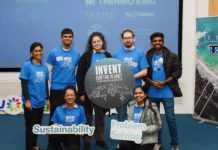
The University of Galway is taking part in a €10 million research project to look at the health risks of climate change in coastal waters.
The BlueAdapt project is specifically looking at the impact of climate change on pathogens in coastal waters, and the health risks that come with it.
University of Galway is one of twelve institutions in ten European countries taking part in the project.
BlueAdapt brings together a team of researchers, including microbiologists, epidemiologists, economists, climate scientists and policy specialists in order to investigate the complex interactions between climate change, pathogen dynamics and human health.
Professor Dearbhaile Morris at University of Galway, said, “Our coastal waters are important for tourism, fishing and recreational activities.”
“Through BlueAdapt we hope to assess how bacteria and viruses in our coastal waters respond to different climate change scenarios and understand better the potential impacts for human health.”
Dr Sinead Duane, Lecturer in Marketing J.E School of Business and Economics at University of Galway added that how people interact with coastal waters needs to be understood.
“Through the development of behaviourally enhanced smartphone app technology, Blue Adapt will deepen our understanding of coastal water users behaviours and attitudes to exposure pollution events.”
“This information will help develop targeted interventions in the future. This app will capture how users respond to warnings of pollution events in real time.”
BlueAdapt is a partnership between University of Galway, the Basque Centre for Climate Change, University of Exeter, Charles University, University of Warsaw, Deltares, CMCC, EuroHealthNet, Bangor University, Istituto Superiore di Sanità, University of the Basque Country and ThenTryThis.











